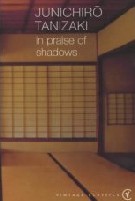Art Is Where Science Can't Go
Thursday, February 22, 2007 → by Robokku
In Praise of In Praise of Shadows
 My brief Wikipediations tell me that Junichirō Tanizaki was one of Japan's favourite authors of the twentieth century. I gather that he captured the tests of identity brought on by Orient's shift towards Western ways - the disorientation, as it were. However, in In Praise of Shadows, his project seems only to be to convey - justify, even - his adoration of some ancient-rooted standards of Japanese aesthetics. He is only interested in the Westward transition in so far as it starts in the East.
My brief Wikipediations tell me that Junichirō Tanizaki was one of Japan's favourite authors of the twentieth century. I gather that he captured the tests of identity brought on by Orient's shift towards Western ways - the disorientation, as it were. However, in In Praise of Shadows, his project seems only to be to convey - justify, even - his adoration of some ancient-rooted standards of Japanese aesthetics. He is only interested in the Westward transition in so far as it starts in the East.
After musing on the toilet (ambiguity intended), he grants his fine attention to gold. Sure, it's "exquisitely beautiful"...
I don't think it is unusual to pay attention to the aesthetic thoughts of artistic people, so I respect Tanizaki's thoughts on how beautiful gold is. But what of those claims about practicality? It seems Tanizaki is being a scientist and a historian. "...other metals quickly lose their gloss," he says, "but gold retains its brilliance indefinitely" - chemistry, all of a sudden, but without any experimental evidence for his claims. And I am sure that if there is an aged document recording that reason for using gold in housewares in nineteenth-century Japan then Junichirō has not read it. If he is not expert in these matters, he speculates.
What good is his testimony, then? As an author, he examines his most personal responses to the world then exposes them and, hence, himself. (Incidentally, Martin Amis sees it that way.) As such, what can Junichirō Tanizaki tell me that isn't merely about Junichirō Tanizaki? I understand from his essay that he feels a particular way about glinting Nō costumes and lacquerware by candlelight. But the implication of his feeling is what rivets me far more: a person can feel that way about the world. And, to take another step, if I follow his prose and can piece together the images he presents, then I think I can understand some beauty in the same things he sees; maybe even the same beauty.

A recent post from Danieru explained with Chaplin-based illustration that our murky mental goings-on could never be shared across some kind of electronic/digital/magical medium. There was essentially just a compatibility issue. But if Tanizaki's feelings about a subject are going to make their way into me at all, then it seems that it will be by the more obvious, ancient, long-developed means he opts for. That is, language. Scrappy, blurry, inconsistent, restrictive language.
And the descriptions that result are a reality abbreviated - first by Tanizaki's own impressions of things and then further by the literary possibilities for encoding those impressions. Then the reader must revive that verbal skeleton without a reliable formulaic process. I too must be creative. But neither Tanizaki's thoughts nor my reading of them amounts to mere speculation. On the contrary, the fact that, inescapably, he lives in his subjectivity and I live in mine only makes me more confident in the power of his apparently loose communications. We are all necessarily familiar with this kind of discourse because there is not really any other kind (as I have suggested before). The pretence that we can completely transcend these uncertainties with rational investigation is quite shallow. Science will not deliver us from this apparent pitfall of human existence, just because no method - however rigorously systematic - can lift any one of us from our unique mental and corporeal isolation.
So when Tanizaki tells of the practicalities of gold's lustre - such as how long it remains reflective - I will listen as much as when he talks about its delicate charm as he sees it (and at least as much as when a chemist speaks on a similar topic). The reason is that a chemist can no more objectively capture and portray nature than an artist. Moreover, what we see as valuable in reflectiveness - the reason reflectiveness is of interest to us at all - is very much one of the poetic notions which is right inside the author's realm. So how long gold holds on to that property is something on which Tanizaki has as much a right as anyone to call himself expert.
 My brief Wikipediations tell me that Junichirō Tanizaki was one of Japan's favourite authors of the twentieth century. I gather that he captured the tests of identity brought on by Orient's shift towards Western ways - the disorientation, as it were. However, in In Praise of Shadows, his project seems only to be to convey - justify, even - his adoration of some ancient-rooted standards of Japanese aesthetics. He is only interested in the Westward transition in so far as it starts in the East.
My brief Wikipediations tell me that Junichirō Tanizaki was one of Japan's favourite authors of the twentieth century. I gather that he captured the tests of identity brought on by Orient's shift towards Western ways - the disorientation, as it were. However, in In Praise of Shadows, his project seems only to be to convey - justify, even - his adoration of some ancient-rooted standards of Japanese aesthetics. He is only interested in the Westward transition in so far as it starts in the East.After musing on the toilet (ambiguity intended), he grants his fine attention to gold. Sure, it's "exquisitely beautiful"...
"..but those in the dark houses of the past were not merely captivated by its beauty, they also knew its practical value; for gold, in these dim rooms, must have served the function of a reflector."
Tanizaki Junichirō, In Praise of Shadows, Vintage, 2001. p.26
I don't think it is unusual to pay attention to the aesthetic thoughts of artistic people, so I respect Tanizaki's thoughts on how beautiful gold is. But what of those claims about practicality? It seems Tanizaki is being a scientist and a historian. "...other metals quickly lose their gloss," he says, "but gold retains its brilliance indefinitely" - chemistry, all of a sudden, but without any experimental evidence for his claims. And I am sure that if there is an aged document recording that reason for using gold in housewares in nineteenth-century Japan then Junichirō has not read it. If he is not expert in these matters, he speculates.
What good is his testimony, then? As an author, he examines his most personal responses to the world then exposes them and, hence, himself. (Incidentally, Martin Amis sees it that way.) As such, what can Junichirō Tanizaki tell me that isn't merely about Junichirō Tanizaki? I understand from his essay that he feels a particular way about glinting Nō costumes and lacquerware by candlelight. But the implication of his feeling is what rivets me far more: a person can feel that way about the world. And, to take another step, if I follow his prose and can piece together the images he presents, then I think I can understand some beauty in the same things he sees; maybe even the same beauty.

A recent post from Danieru explained with Chaplin-based illustration that our murky mental goings-on could never be shared across some kind of electronic/digital/magical medium. There was essentially just a compatibility issue. But if Tanizaki's feelings about a subject are going to make their way into me at all, then it seems that it will be by the more obvious, ancient, long-developed means he opts for. That is, language. Scrappy, blurry, inconsistent, restrictive language.
And the descriptions that result are a reality abbreviated - first by Tanizaki's own impressions of things and then further by the literary possibilities for encoding those impressions. Then the reader must revive that verbal skeleton without a reliable formulaic process. I too must be creative. But neither Tanizaki's thoughts nor my reading of them amounts to mere speculation. On the contrary, the fact that, inescapably, he lives in his subjectivity and I live in mine only makes me more confident in the power of his apparently loose communications. We are all necessarily familiar with this kind of discourse because there is not really any other kind (as I have suggested before). The pretence that we can completely transcend these uncertainties with rational investigation is quite shallow. Science will not deliver us from this apparent pitfall of human existence, just because no method - however rigorously systematic - can lift any one of us from our unique mental and corporeal isolation.
So when Tanizaki tells of the practicalities of gold's lustre - such as how long it remains reflective - I will listen as much as when he talks about its delicate charm as he sees it (and at least as much as when a chemist speaks on a similar topic). The reason is that a chemist can no more objectively capture and portray nature than an artist. Moreover, what we see as valuable in reflectiveness - the reason reflectiveness is of interest to us at all - is very much one of the poetic notions which is right inside the author's realm. So how long gold holds on to that property is something on which Tanizaki has as much a right as anyone to call himself expert.
|
|

 Links
Links Subscribe via RSS!
Subscribe via RSS!


 Via Email
Via Email


I am captivated by the idea that art somehow describes reality in far greater detail than other, more 'rational' enterprise. I have recently studied the poetic works of Denise Levertov, in her essay 'Some Notes on Organic Form' she notes:
"Organic [art] is a method of apperception, i.e. of recognizing what we perceive, and is based on an intuition of an order, a form beyond forms, in which forms partake, and of which man's creative works are analogies, resemblances, natural allegories. Such [art] is exploratory."
Reading your post, I was also reminded of the works of Olaf Stapledon. From 'Last and First Men':
"Human works of pure art were thought of as instruments through which man might behold an admire some aspect of the cosmic beauty. They were said to focus together features of the cosmos too vast and elusive for man otherwise to apprehend their form."
All reality is perception. Each of us holds in our mind an amalgamation of ideas; feelings; apprehensions that, in combination, grow to form a focal point from which to intend a world. Art, therefore, is the truest conception of reality, for in its acknowledgement of itself as a fiction, as a representation, it instantly raises itself above common perception: the admittance of its inadequacy is actually an admission better deserved by a truer representation. As Roland Barthes suggested:
"...art must cut all illusion, even that of nature; sign must be partially arbitrary, without which we fall back into an art of expression, into an art of essentialist illusion."
Barthes believed that an art which allowed its perceiver to acknowledge its ‘unreality’ was superior to other forms of communication because the pretence of non-reality is recognised by definition. This is the major distinction between the true 'artist' and the true 'scientist'. One relies on his folly; the other relies that others will not perceive his undertaking as folly.
Which viewpoint better comes to realise reality, must by definition rely on the perceiver.
I am coming to accept the reality of art, of subjective existence, as the superior form of 'truth'.
February 23, 2007 12:28 AM
Post a Comment